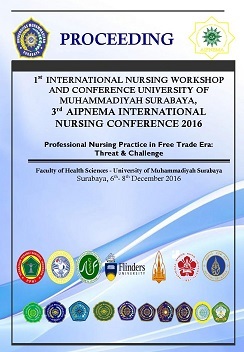Relationship Between Social Capital And Community Awareness Regarding Dengue Fever Prevention (DHF)
Abstrak
Introduction: the occurrence of dengue fever (DBD) can be prevented and reduced by increasing community self-awareness about the impact of that event through social capital which is consisted of norms of trust and cooperation can help to raise public awareness. The purpose of this research was to analyze the social capital relations with public awareness in the prevention of dengue fever. Methods: the research design used is cross sectional study with analysis unit the heads of households who are in the working area of Tanggulangin as much as 148 samples. The sampling method used was multistate random sampling. The research instrument used questionnaire that has been tested for validity and reliability. The gathered data were analyzed by chi-square statistic. Results: the results showed that social capital with norm indicators p-value of 0, 337 > α = 0,05, p-value of trust with 0.000 < α = 0,05, while cooperation with p-value of 0.750 > α = 0,05. Conclusion: The discussions and conclusions of these three indicators of social capital showed that only trust which is related to public awareness in the prevention of dengue fever. The strengthening of social capital in increasing public awareness is very important approach to reform. Social capital can mobilize society in Sidoarjo, in preventing and combating the incidence of dengue fever properly.
Â
Keyword: Social Capital, DHF, Public Awareness
Referensi
Cox, E. (1995) Background Material and Boyer Lecture (http://www.leta.edu.au/Coxp.htm).
Colemen, J.S. (1998) Social Capital: The Creation of Human Capital, American Journal of Sociology, 94 (Supplement), S95-S120, (Dalam Word Bank, 1998, pp 5-7).
Fukuyama, F. (1995) Trust: The Social Virtues and the Creation of Prosperity, New York: Free Press, ISBN 0684825252.
Fukuyama. (2000) Social Capital and Development: The Coming Agenda. SAIS Review XXII, (1): 23-37.
Onyx. (1996) The Measure of Social Capital, “Paper presented to Australia and New Zealand Third Sector Research Countain on Social Kohesim Justice and Citizenship,†The Role of Voluntary Sector, Victoria University Wellingston.
Putnam, R.D. (1995) Bowling Alone: America’s Declining Social Capital. Journal of Democrazy.
Putnam dan Robert, D. (2000) Bowling Alone: The Collapse and Revival of American Community, New York: Simon dan Schuster, ISBN 9780684832838.
Riddell M, (1997) Bringing Back Balance to Policy Development in Robinson ed. In David Robinson ed. Social Capital and Policy Development. Wellington, NZ: Institute of Policy Studies;
Robinson, S.L. (1996) Trust and Breach of the Psychological Contract. Administrative Science Quarterly, 41, 574–590.






